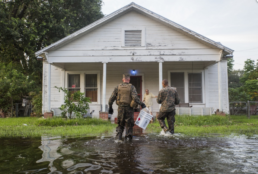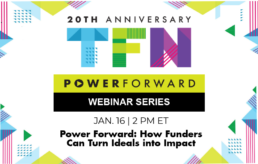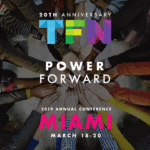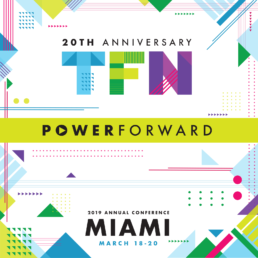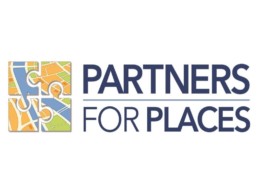Securing Safe Drinking Water For All
By Juliet Christian-Smith, Program Officer, Water Foundation (via HEFN)
This post originally appeared on the Health and Environmental Funders Network blog. TFN is a co-sponsor of HEFN's April 9 webinar, Activity On Tap: Looking Across The Drinking Water Landscape.
Growing up, my family spent a week every summer on a small island off the coast of Maine reliant on cisterns for fresh water. Water was closely rationed, and showers were scarce. The daily ritual of filling up two pitchers of water for use throughout the day piqued a life-long interest in the limits of our fresh water resources. My passion for all things water eventually grew into a profession as I went on to get a Ph.D., focused on water resource management.
For years, I studied the intricacies of America’s water systems – from the complex laws and regulations that govern how we move and share water to how climate change is creating more violent floods, droughts, and fires. My training as a scientist encouraged me to constantly question underlying assumptions and my passion led me to connect my research to the experiences that directly touch people’s lives.
Now, at the Water Foundation, I use that training and passion to work with creative, ambitious, and thoughtful partners every day to advance lasting water solutions that are informed by science and by the most urgent needs facing communities across the country.
We all need safe, affordable, and reliable drinking water to survive. But in the U.S. today, millions of families and children wake up each morning to toxic, undrinkable tap water. The problem is widespread—touching urban and rural areas alike—but disadvantaged communities continue to be ones most likely to have contaminated water in their homes and schools. Unsafe drinking water is not only a public health crisis but also a reflection of deep inequities and underinvestment in poor communities. Where a person lives and how much money they have can determine whether they get water that is safe and clean.
In this environment, it is not surprising public polling consistently shows that polluted drinking water is among Americans’ greatest worries and highest priorities, cutting across ideology and political affiliations. In 2019, public officials are prioritizing drinking water in their own agendas.
Governor Tony Evers of Wisconsin, for example, in his first State of the State Address, said that 2019 will be the “year of clean drinking water.” New Jersey’s Governor Phil Murphy in his address asked for federal help replacing old pipes. Governor Gavin Newsom in California, kicked off his tenure with a visit to a rural Californian community struggling with clean, affordable drinking water. And, just this past month, the U.S. House of Representatives Committee on Oversight and Reform environmental subcommittee held a hearing to investigate pervasive PFAS contamination.
Philanthropy Can Help Support Sustainable And Equitable Drinking Water Solutions
In the wake of the Flint, Michigan, drinking water crisis and the work of organizations like HEFN, a growing number of funders have begun to recognize the often-hidden public health crisis of unsafe drinking water. Yet, many also voice uncertainty on how best to solve the problem, especially when water policy is traditionally viewed as overly complex and intractable.
To help funders understand the current and emerging threats to drinking water—and solutions they can pursue to tackle both immediate problems and root causes, the Water Foundation recently developed an introductory guide, Securing Safe Drinking Water for All. In the guide, we cover how unsafe drinking water threatens public health as well as offer specific philanthropic interventions that can get to the heart of the challenge.
Key philanthropic interventions that are identified in the guide include:
- Diversifying water leadership,
- Building capacity of small water systems,
- Encouraging investment in drinking water treatment and infrastructure,
- Supporting more comprehensive water testing,
- Supporting structural changes to improve water affordability, and
- Championing climate-smart water supply solutions.
Funders are invited to preview the report during the April 9 webinar, “Activity on Tap: Looking Across the Drinking Water Landscape,” cosponsored by the Biodiversity Funders Group, Environmental Grantmakers Association, the Funders’ Network for Smart Growth and Livable Communities, Grantmakers In Health, and HEFN. I will be moderating a discussion where expert speakers -- Radhika Fox, US Water Alliance; Tom Neltner, Environmental Defense Fund; and Nse Witherspoon, Children’s Environmental Health Network --- will discuss three hubs of activity around drinking water. Click here to read more and register for the webinar today.
As funders, we have the ability and opportunity to drive and scale meaningful solutions to make sure every family has safe drinking water. Please join me on April 9 to learn more about the drinking water landscape and to strengthen connections among other funders for us all to make a difference.

Juliet Christian-Smith is a senior program officer at the Water Foundation with more than a decade of scientific research and policy analysis experience in addition to expertise in water, climate and sustainability issues. She came to the Water Foundation from the Union of Concerned Scientists where she helped lead water and climate work as a senior climate scientist. She earned her Ph.D. in Environmental Science, Policy, and Management from the University of California, Berkeley.
Arriving early? Check out our pre-conference events at #TFNMiami
By Tere Figueras Negrete, Director of CommunicationsThe Funders' Network for Smart Growth and Livable Communities (TFN) is excited to bring our 20th Anniversary Conference back to Miami, the site of our first conference, March 18-20.In addition to our conference lineup of thought-provoking speakers and sessions, we also have a host of before and after #TFNMiami, including several deep-dive learning opportunities, our popular Sunday Night at the Movies and our first-ever PLACES 10th Anniversary Equity Bash.You're welcome to come a little early in order to take advantage of the pre-conference events listed below. (With the exception of the PLACES 10th Anniversary Bash, these events are included in your conference registration, although please note separate RSVPs are required for some events.)Program update: Registration for our Wednesday post-conference tour, Anchoring Change: The New Civics of Miami's Next Economy has reached capacity and is now closed. If you'd like to be placed on a waiting list in case a spot becomes available, please contact Alicia Kitsuse. |

| Sunday, March 17 |
| When Waters Rise 2.0: Equitable Recovery and Resilience Sunday | Noon to 4:30 PM Miami Marriott Biscayne Bay Climate risks pose an existential threat to coastal communities around the globe. Sea levels are rising at alarming rates, coastal land is subsiding in certain areas, and storms are becoming more intense and more frequent. This greater risk of disasters can mean catastrophic losses, especially for those who are socially, environmentally, and economically vulnerable.In June, the Greater New Orleans Foundation launched the When Waters Rise Initiative with an initial convening that brought together community foundations and place-based funders from Rhode Island to Texas to discuss local funders’ roles in contributing to equitable disaster recovery, rebuilding, and long-term resilience.Please join When Waters Rise 2.0 to further explore how place-based funders and community foundations can support equitable disaster recovery and rebuilding efforts grounded in resiliency. Please visit our conference agenda for more information Note: Registration is free but is limited to 40 participants and requires separate registration. Please register via this link. For questions about the convening, email Ella Delio; for problems with registration, email Kristen Craig. |
| PLACES Alumni Gathering Sunday | 12:30 PM - 5:30 PM Miami Beach Community Church |1620 Drexel Ave. | Miami Beach |
| Reimagining the Civic Commons Sunday | 4 PM – 5 PM Knight Foundation | 200 S. Biscayne Blvd, Suite 3300 | Downtown Miami Reimagining the Civic Commons fosters engagement, equity, environmental sustainability and economic development by revitalizing and connecting civic assets. This national initiative is a collaboration of The JPB Foundation, Knight Foundation, The Kresge Foundation and The Rockefeller Foundation, as well as local partners. Projects in Akron, Chicago, Detroit, Memphis, and Philadelphia seek to demonstrate how strategic investments in parks, libraries, trails and community centers can connect people of all backgrounds, cultivate trust and counter the trends of social and economic fragmentation in cities and neighborhoods.Learn more about Reimagining the Civic Commons at this event, hosted by the Knight Foundation. Speakers: |
| TFN Welcome Reception Sunday | 5:00 PM - 6:30 PM Miami Marriott Biscayne Bay Connect with fellow funders, TFN President & CEO Pat Smith, and members of our Board of Directors. We especially welcome first-time conference attendees to join us as we kick off TFN’s 20th Anniversary Conference. |

| Sunday Night at the Movies Sunday 6:30 PM - 8:30 PM Miami Marriott Biscayne Bay Throughout the 1970's, an epidemic of fires consumed the South Bronx, reducing entire blocks to rubble, covering neighborhoods in a permanent haze of smoke and destroying 80 percent of the area’s housing stock. Decades later, Bronx-born filmmaker Vivian Vazquez set out to pursue the truth in Decade of Fire, uncovering policies of racism and neglect that still shape our cities.Presented in partnership with the Wyncote Foundation and The Kendeda Fund, our Sunday Night at the Movies will include a screening of the film as well as a conversation with Vazquez. |
| PLACES 10th Anniversary Equity Bash 8 PM - Midnight Boombox 3456 N. Miami Avenue We'll celebrate 10 years of TFN’s PLACES with our first-ever Equity Bash. Come dance the night away, Miami-style. Join us at Boombox lounge in Midtown Miami, located between the Wynwood and Design District neighborhoods.Note: Requires a separate ticket. Tickets for this event can be purchased when you register for conference. This event is open to all TFN PLACES Fellows and Alumni, TFN conference attendees and guests. |
| Monday, March 18 |
| Pre-Conference Institutes 9 AM - 11:30 AM Miami Marriott Biscayne BayWe're offering two Pre-Conference Institutes this year! Check out our #TFNMiami Agenda for speaker updates. Power for Storytelling: Raising Voices, Driving Change, Creating a Sustainable Future: Explore collaborative approaches to storytelling that are developed in partnerships with local communities. Through stories and case studies, film clips and dialogue, this institute will explore the power that film and communications media can bring to communities, building a renewable, equitable and resilient economy that works for all. Power for Policy: Opportunity Zones, Equitable Development and Philanthropy: In 2017, Congress created a new tool for tax incentive to attract long-term private sector investment in low-income neighborhoods across the country: Opportunity Zones. This policy creates a fundamental question for those concerned with racially equitable and inclusive economic development: Will this policy be a tool for displacement and gentrification that extracts wealth from communities, or will it authentically connect residents with new businesses, jobs and housing that emerge from Opportunity Zone investments?We’ll explore how national philanthropic leaders and others are using their collective resources to influence how this new federal program unfolds, and ensure outcomes are truly equitable. |
| About Our Conference |
| Join us for TFN’s 20th Anniversary Conference in Miami, March 18-20, to explore how we can turn ideals into action.Our conference theme: Power Forward, a call to action for philanthropy to leverage the sector’s collective power to create communities and regions that are truly sustainable and just — work that has taken on new urgency as we face increasingly challenging times. |
| Our Venue TFN’s 2019 Anniversary Conference: Power Forward takes place March 18-20 at the Miami Marriott Biscayne Bay, located in Downtown Miami across the bay from South Beach and a short hop to neighborhoods like Wynwood and Little Haiti.Call 1-800-295-1421 for reservations and mention the FUNDERS’ NETWORK to receive the conference rate of $249 plus tax per night. Or you can book online here. |
| RegistrationRegistration is open to donors, staff, directors, and trustees of all grantmaking institutions. Visit our Power Forward webpage for more information. |
Hear the untold story of the Bronx's 'Decade of Fire' at #TFNMiami's Sunday Night at the Movies
By: TFN Staff
|
The Funders’ Network is proud to feature Decade of Fire at this year’s Sunday Night at the Movies on March 17, kicking off TFN’s 20th Anniversary Conference: Power Forward in Miami. |
|
Presented in partnership with the Wyncote Foundation and The Kendeda Fund, our Sunday Night at the Movies will include a screening of the film as well as a conversation with Vazquez. She'll join us in Miami to discuss the film, which confronts the racially charged stereotypes that dehumanized residents of the South Bronx in the 1970’s, and rationalized their abandonment by city, state and federal governments. “Growing up in the South Bronx, I often heard that we, the blacks and Puerto Ricans, do not know how to take care of our neighborhoods. That we are to blame for its problems, the reason our neighborhoods turned to rubble and ruin,” said Vazquez, whose film recalls how her neighbors came together to resist – and rebuild. “Now, I am sharing their stories, for the sake of people who work for justice today.” |
|
As communities across the United States face the increasing threats of displacement and gentrification, Vazquez and the team behind Decade of Firehope the stories told in the film have resonance beyond the Bronx: shedding light on the systemic practices and beliefs that are at the root of these housing issues, while showing how communities can generate solutions from within. |
|
“These unsung heroes put everything on the line to keep their blocks and neighborhoods intact. I want to let the world know what they did, how they did it and why it means everything to us today.” Go deeper: NPR's Latino USA recently featured Decade of Fire. Check out the full story here. Sunday Night at the Movies, presented in partnership with the Wyncote Foundation and The Kendeda Fund, takes place at 6:30 p.m. March 17 as part of TFN’s 20th Anniversary Conference: Power Forward. Join us for pizza, popcorn and other movie-friendly treats. The event is included in your conference registration – no additional RSVP needed. |
 |
About Our Conference |
Our VenueTFN’s 2019 Anniversary Conference: Power Forward takes place March 18-20 at the Miami Marriott Biscayne Bay, located in Downtown Miami across the bay from South Beach and a short hop to neighborhoods like Wynwood and Little Haiti. Call 1-800-295-1421 for reservations and mention the FUNDERS’ NETWORK to receive the conference rate of $229 plus tax per night. Or you can book online here. |
|
Join us for TFN’s 20th Anniversary Conference in Miami, March 18-20, to explore how we can turn ideals into action. Our conference theme: Power Forward, a call to action for philanthropy to leverage the sector’s collective power to create communities and regions that are truly sustainable and just — work that has taken on new urgency as we face increasingly challenging times. |
RegistrationEarly Bird registration ends Feb. 15! Registration is open to donors, staff, directors, and trustees of all grantmaking institutions. Visit our Power Forward webpage for more information. |
Join us for a LIVE podcast taping! 'Healing Justice' comes to #TFNMiami
By: TFN StaffDo you love podcasts? We certainly do! That's why we're excited to host a live, interactive taping of the Healing Justice Podcast at TFN's 20th Anniversary Conference in Miami, March 18-20. |
|
The Healing Justice Podcast is an audio project that seeks to democratize access to inspiring stories, leaders, and practices — and create a virtual campfire around which we can gather to share tales of victory and pain, visionary ideas and generative debates. The podcast's team hopes to equip social justice leaders with practices for healing, sustainability, and resilience in their lives and work. In its first year alone, the podcast has been downloaded more than 500,000 times worldwide. You can find the conversations and practices they share on Apple Podcasts, RadioPublic, Spotify, or wherever you listen to podcasts. The Healing Justice Podcast team will join us immediately prior to our evening Eat Here! event on March 19 to record an episode titled Food, Justice, and Healing. One of TFN's signature conference events, Eat Here! is a strolling dinner featuring local farmers, providers, and chefs who place a special emphasis on health, community, and sustainability. |
|
This year's Eat Here! takes place at the Little Haiti Cultural Complex, located in Miami's Little Haiti neighborhood — a hub for much of South Florida's Haitian diaspora and other Caribbean communities. Join TFN and the Healing Justice Podcast to explore our own food stories, hear from food justice leaders, and be part of an interactive, live podcast taping. The podcast taping and Eat Here! event are both included in the conference registration — no separate RSVP is required. Register for #TFNMiami today! |
 |
About Our Conference |
Our VenueTFN’s 2019 Anniversary Conference: Power Forward takes place March 18-20 at the Miami Marriott Biscayne Bay, located in Downtown Miami across the bay from South Beach and a short hop to neighborhoods like Wynwood and Little Haiti. Call 1-800-295-1421 for reservations and mention the FUNDERS’ NETWORK to receive the conference rate of $229 plus tax per night. Or you can book online here. |
|
Join us for TFN’s 20th Anniversary Conference in Miami, March 18-20, to explore how we can turn ideals into action. Our conference theme: Power Forward, a call to action for philanthropy to leverage the sector’s collective power to create communities and regions that are truly sustainable and just — work that has taken on new urgency as we face increasingly challenging times. |
RegistrationEarly Bird registration ends Feb. 15! Registration is open to donors, staff, directors, and trustees of all grantmaking institutions. Visit our Power Forward webpage for more information. |
Storytelling in times of trauma: How the Houston Flood Museum gives voice to Harvey survivors
By Bao-Long Chu, Program Officer, Houston Endowment
Stories and storytelling are powerful tools. Stories can help a community explain who they are, what they want and why it matters.

After a disaster, stories provide a way for people to feel that they have control over the world, see patterns where there is chaos, and meaning where there is randomness. Storytelling after trauma can help survivors to get on a path toward healing and to resurface from loss onto a new shore.
In 1954, my parents – along with nearly one million northerners – took to the rain-soaked roads from Hanoi and fled south when Vietnam was partitioned by the Geneva Accords. In 1975, my family was airlifted out of Saigon two days before the fall of that lush city. We were spared from joining the estimated 1.5 million boat people who fled Vietnam, many of whom took to the open sea in makeshift boats.
Moving from loss to loss, my parents told stories to build hope and grit in us. I am a poet because I believe that collecting and amplifying their stories is critical for my family. Our stories are not unique, but my telling gives us a voice. The post-war stories and poems from colleague writers of my generation, those who have crossed oceans, grown up in America and been fed by storytelling, have filled bookshelves for many years.
In the early morning of August 27, 2017, my parents faced another loss – they were rescued and carried through two feet of water inside their house onto a skiff. Hurricane Harvey’s relentless rain had inundated theirs along with thousands of other homes across the upper Texas coast. Their rescue was one of many that was carried out by a fleet of resident responders from makeshift boats. The images of the volunteer flotilla began to merge with those of boat people in my head.

The idea to collect Harvey stories began in conversations, even before the water receded, with my program officer colleagues as we were discussing how to support vulnerable communities. Providing a platform to gather and amplify stories about what it means to survive as a Houstonian, especially to elevate the voices of those not often heard, aligns with our priority of equitable arts engagement and our recognition that stories can build civic attachment and empathy.
Houston Endowment funded the Houston Flood Museum (HFM) based on a concept by Rice University creative-writing professor Lacy M. Johnson, a memoirist who writes about justice and life after trauma. HFM exemplifies the synchronicity of grantmaking and a grantor-grantee relationship in which shared goals, trust and empathy translate resources into impact. (Read more here and here about its evolution.)
Not a traditional brick-and-mortar museum, HFM is an online, community-driven platform. The museum opened its virtual doors in August 2018 with current exhibitions that contain nearly 1,200 artifacts – a wide range of personal photographs; commissioned art; satellite images; letters from students, videos and podcasts from Houston Public Media; essays in Spanish and English; recorded meditations from Rothko Chapel; and written and performance poetry, including “A Poem for Houston” by Houston Poet Laureate Deborah D.E.E.P Mouton. Beyond the perspectives from elected officials, local heroes, civic and nonprofit leaders, the goal to elevate the voices of everyday Houstonians is fully realized with stories Gloria, Edwardo, Erika, Briana and many others.

As my parents taught me, stories after a disaster do not have an expiration date, thus the work of collecting is ongoing for HFM. Through partnerships with Harvey Memories Project, a consortium of 30 librarians, archivists and data scientists (representing Rice University, University of Houston, Houston Public Library and Harris County Public Library), and several literary and visual arts groups such as FotoFest, Inprint, Writers in the Schools and Writespace, HFM is working in communities to acquire artifacts. New exhibitions are anticipated periodically.
HFM represents a fresh approach to acquisitions and accessibility, which has generated interest from the field of museums. The Jefferson County Memorial Project and Smithsonian National Museum of American History recently contacted Johnson, who leads the project with an advisory board of community stakeholders, to learn more about HFM. Research shows that many small history museums struggle with dwindling visitation and revenues; outsized expenses from maintaining historical assets; and diminished relevance in the face of demographic change and competing interests. Currently, Houston Endowment supports a capacity-building project from the Texas Association of Museums that aims to encourage a cohort of small local history museums to consider and implement "alternative futures," which may include a model like HFM.
Why do stories matter to communities, and why should funders support storytelling? The answer lies in media scholar George Gerbner’s quote: “Whoever tells the stories of a culture defines the terms, the agenda, and the common issues we face.” If we follow this assumption, then whose stories we hear is intertwined with all the pillars of our work to advance equity and enhance vibrancy. Equitable stories are essential to a healthy, sustainable and just society.
About the Author
 Bao-Long Chu oversees grantmaking for the majority of the Houston Endowment's arts and culture portfolio. Prior to joining Houston Endowment in 2015, Long was associate director of the literary-education nonprofit Writers in the Schools (WITS) where he developed his extensive background in literacy, arts, and community engagement and worked in collaboration with a wide variety of Houston-area institutions and organizations, including Art League Houston, Houston Grand Opera, Texas Children’s Hospital and University of Houston Moores School of Music. Long has also written and presented extensively on writing pedagogy, the connection between art and the refugee experience, and non-profit programming. Originally from Vietnam, Long earned a Bachelor of Arts degree in English and psychology from Houston Baptist University and a Master of Fine Arts degree in creative writing from the University of Houston Creative Writing Program. His poems and essays have been published in several anthologies, including The New Anthology of American Poetry: Postmodernisms 1950-Present and From Both Sides Now: The Poetry of the Vietnam War and Its Aftermath. His libretto for HGO’s East + West initiative, Bound, premiered in 2014. Long has served on the boards of DiverseWorks and Gulf Coast: A Journal of Literature and Fine Arts.
Bao-Long Chu oversees grantmaking for the majority of the Houston Endowment's arts and culture portfolio. Prior to joining Houston Endowment in 2015, Long was associate director of the literary-education nonprofit Writers in the Schools (WITS) where he developed his extensive background in literacy, arts, and community engagement and worked in collaboration with a wide variety of Houston-area institutions and organizations, including Art League Houston, Houston Grand Opera, Texas Children’s Hospital and University of Houston Moores School of Music. Long has also written and presented extensively on writing pedagogy, the connection between art and the refugee experience, and non-profit programming. Originally from Vietnam, Long earned a Bachelor of Arts degree in English and psychology from Houston Baptist University and a Master of Fine Arts degree in creative writing from the University of Houston Creative Writing Program. His poems and essays have been published in several anthologies, including The New Anthology of American Poetry: Postmodernisms 1950-Present and From Both Sides Now: The Poetry of the Vietnam War and Its Aftermath. His libretto for HGO’s East + West initiative, Bound, premiered in 2014. Long has served on the boards of DiverseWorks and Gulf Coast: A Journal of Literature and Fine Arts.
The Funders' Network is happy to share news and original content from our members and partners. If you's like to suggest or contribute a blog post, please reach out to Director of Communications Tere Figueras Negrete.
Dr. Judith Monroe of the CDC Foundation: Strong partnerships and flexible resources can save lives
By Dr. Judith Monroe, President & CEO of the CDC Foundation
TFN's Philanthropic Preparedness, Resiliency and Emergency Partnership (PPREP) recently held a convening in Oklahoma City, Okla., for the members of the PPREP learning cohort to explore the ways public policy and public organizations influence disaster readiness and recovery and hear from leading voices in the public policy arena. Among the participants in the convening was Dr. Judith Monroe, president and CEO of the CDC Foundation, who joined representatives from FEMA, the USDA and the the U.S. Small Business Administration on a panel addressing how public policy impacts federal agencies.
When you’re in the middle of an emergency, it’s not the time to exchange business cards. That advice, which I’ve heard many times, seemed particularly relevant at a regional Philanthropic Preparedness, Resiliency and Emergency Partnership (PPREP) meeting in early November.
At the event facilitated by the Funders’ Network for Smart Growth and Livable Communities and the Center for Disaster Philanthropy with support by the Margaret A. Cargill Philanthropies, I was honored to serve as a panelist, and fascinated by the strong relationships and thoughtful dialogue among the learning cohort of community foundations and grantmakers from the ten-state Midwest region.
It seemed particularly fitting that this meeting took place in Oklahoma City, one of the top U.S. areas for tornadoes, which we learned more about on a visit to Oklahoma’s National Weather Center. There, researchers leverage predictive analysis tools and techniques to improve forecasting for dangerous weather events to protect us all.
In terms of health protection, the Centers for Disease Control and Prevention (CDC) plays a crucial role in supporting state and local partners to help communities prepare for any health crisis, whether chronic or acute, natural or manmade. And although I served in a leadership role with CDC for six years and have interacted with CDC from a number of angles over the course of my career, at the meeting I was representing the congressionally-created independent CDC Foundation.
People often ask me why a large agency like CDC needs a foundation. The reality is that for any federal agency, even during emergencies, there are challenges with federal dollars tied to appropriations and restrictions that can limit the ability to act quickly. Immediate, flexible resources can fill gaps to enhance the implementation of policies and to save and protect lives during times of crisis. In our 23-year history of managing approximately 1,000 CDC-led programs, we have learned that strong relationships and partnerships are crucial to helping CDC tackle some of the world’s toughest health challenges at home and abroad.
As just one example, following the devastating 2017 hurricanes, the CDC Foundation served as an integral partner to CDC, the Puerto Rico Department of Health and the U.S. Virgin Islands Department of Health in implementing response and recovery activities aimed at shoring up and restarting critical public health infrastructure.
We worked with CDC to carry out a territory-wide vaccination campaign in Puerto Rico for more than 110,000 people; restored partial lab capacity at the Puerto Rico Department of Public Health by shipping over 3,200 lab specimens to CDC for partial testing; supported over 300 displaced people from the U.S. Virgin Islands who sought medical treatment in the Southeastern United States by addressing requests for travel support, over-the-counter medicine and transportation to treatment; and funded construction of a mobile clinic to deliver much-needed vaccines, health screenings and clinical services to the residents of U.S. Virgin Islands.
These are just a few instances of support for CDC that would not be possible without our philanthropic and private-sector partners.
And while the Foundation’s tagline is “together our impact is greater,” that statement is much more to us than a tagline. Each day, in the hundreds of programs we manage domestically and globally, we strive to live out that statement because we strongly believe people, groups and organizations have a greater positive impact and can accomplish more together.
The collaborative mindset that we apply in our work is also front and center among my Midwest colleagues, who clearly have a deep understanding of challenges in their region—and are committed to working together on an ongoing basis to create stronger, more resilient communities in the wake of disasters.
About the Author
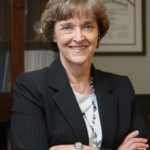 Judith Monroe, MD, is president and CEO of the CDC Foundation. Over her career, Monroe’s professional focus has centered on the intersection of primary care and public health. Prior to joining CDC in 2016, Dr. Monroe served as director of CDC’s Office for State, Tribal, Local and Territorial Support for six years, and also previously served as state health commissioner for Indiana from 2005 to 2010. She was president of the Association of State and Territorial Health Officials from 2008 to 2009 and has served on numerous national advisory committees and boards.
Judith Monroe, MD, is president and CEO of the CDC Foundation. Over her career, Monroe’s professional focus has centered on the intersection of primary care and public health. Prior to joining CDC in 2016, Dr. Monroe served as director of CDC’s Office for State, Tribal, Local and Territorial Support for six years, and also previously served as state health commissioner for Indiana from 2005 to 2010. She was president of the Association of State and Territorial Health Officials from 2008 to 2009 and has served on numerous national advisory committees and boards.
This Energy Policy Targets Vermont's Largest Emissions Sources: Heating and Transportation
By High Meadows Fund
TFN member High Meadows Fund recently shared this blog post, originally published on the High Meadow Fund's blog. If your organization would like to share or cross-post a blog with TFN, please reach out to TFN Communications Director Tere Figueras Negrete.
A new report by Energy Futures Group takes a look at a fairly recent component of Vermont’s energy policy. The report focuses on “Tier 3” of Vermont’s Renewable Energy Standard, which the legislature passed in 2015. This set of policies requires utility companies to draw a certain amount of energy from renewable sources. While other pieces, or tiers, of the Renewable Energy Standard increase renewable energy in the electrical grid, Tier 3 is about helping Vermonters clean up heating and transportation. High Meadows provided support for this report because we wanted to better understand how Tier 3 works and what the policy looks like in practice.
The report refers to Tier 3 as the “Statewide Total Energy Program,” or STEP, to emphasize that this provision is about more than just electric energy— for the rest of this post, we’ll also use the name STEP. STEP was designed to replace fossil fuels with cleaner, renewably-sourced electricity, local wood fuels, biofuels and to increase efficiency to reduce net carbon emissions.
Many of Vermont’s previous energy policies and programs have focused on saving electricity as a means of reducing greenhouse gas emissions. Today, renewable sources like hydropower, wind and solar are providing cleaner kilowatts. However, 75% of Vermont’s total greenhouse gas emissions are generated from driving our cars and trucks, as well as heating our water and homes.
STEP requires Vermont’s electric utilities to help their customers reduce fossil fuel consumption. For example, utilities can provide a price-break for their customers to purchase cold climate heat pumps and electric vehicles. Customers can also use new incentives to lower energy bills by weatherizing their homes or switching to advanced wood heat, like automated wood pellet stoves.
The report estimates STEP could lead to as much as $300 million in lifetime savings from measures put in place over the next 15 years. Those savings are equivalent to about 148 million gallons of oil, or about double the amount of oil Vermonters used in 2016 to heat their homes.
While the legislation that established STEP sets out specific targets for utilities, it leaves discretion as to how those utilities can achieve those goals. The report gives some examples of the utilities’ different approaches, reflecting the different regions of the state they serve. For example, the Burlington Electric Department is subsidizing the cost of electric transit buses. More rural utilities, such as Vermont Electric Coop and Washington Electric Coop, have focused on residential heating improvements or converting maple sugar producers from propane to electric energy. Green Mountain Power has focused on commercial and industrial customers, as well as electric vehicles.
It’s exciting to see how this policy is taking shape and helping Vermont homeowners, commuters, and businesses lower their contributions to greenhouse gas emissions. If you’d like to learn more about how you can do that too, we encourage you to contact your electric utility or Efficiency Vermont.
You can find a summary of the report here, and the complete white paper here.
TFN Launches 20th Anniversary 'Power Forward' Webinar Series
By: TFN StaffAs part of TFN’s 20th Anniversary in 2019, we’re launching a series of deep-dive webinars that examine how philanthropy can leverage its collective power across a range of critical issues: policy work, sustainability efforts, economic prosperity, and supporting equity and inclusion in grantmaking. We’ll kick off this year-long learning experience with our first webinar, featuring speakers who will provide context and expertise as we continue the conversation about power — as well as offer a preview of TFN’s 20th Anniversary Conference: Power Forward, which takes place March 18-20 in Miami. Power Forward: How Philanthropy Can Turn Ideals into Impact The webinar will feature insight from the National Committee for Responsive Philanthropy, which this year released Power Moves, a philanthropy self-assessment guide to determine how well you are building, sharing and wielding power. The theme for our conference as well as our 2019 webinar series — Power Forward — is a call to action for philanthropy to leverage the sector’s collective power to create communities and regions that are truly sustainable and just, work that has taken on new urgency as we face increasingly challenging times.
|
| Please register for this funder-only webinar by Jan. 11 to receive log-in details. |
Power Forward: Registration open for TFN's 20th Anniversary Conference
By Lilly Weinberg and Shamar Bibbins, TFN 20th Anniversary Conference Co-chairs
We are thrilled that registration is now open for TFN’s 2019 Anniversary Conference: Power Forward, which takes place March 18-20 in Miami.
Next year marks the 20th anniversary for the network, and we’re excited for the opportunity to reflect on the past, explore the present and look forward to the future. For this milestone, TFN returns to Miami – the site of its inaugural conference and home of its main office.
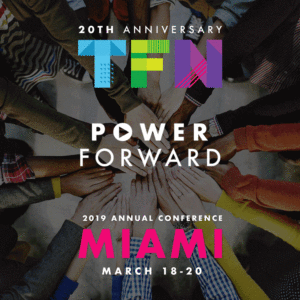 As funders active in Miami, we know that the city possesses myriad charms: beautiful beaches, a thriving arts scene, and a local vibrancy influenced by cultures from Latin America, the Caribbean and beyond. We also know that Miami is also trying to find solutions to many of the critical issues facing communities across the U.S. and Canada, such as the very real effects of climate change, social and economic inequities, and stewardship of natural resources. We’ll look to Miami as a learning laboratory as we explore the intersections that cut across these issues and have informed this year’s conference program.
As funders active in Miami, we know that the city possesses myriad charms: beautiful beaches, a thriving arts scene, and a local vibrancy influenced by cultures from Latin America, the Caribbean and beyond. We also know that Miami is also trying to find solutions to many of the critical issues facing communities across the U.S. and Canada, such as the very real effects of climate change, social and economic inequities, and stewardship of natural resources. We’ll look to Miami as a learning laboratory as we explore the intersections that cut across these issues and have informed this year’s conference program.
Our conference theme, Power Forward, is a call to action for philanthropy to leverage the sector’s collective power to create communities and regions that are truly sustainable and just — work that has taken on new urgency as we face increasingly challenging times.
We hope you’ll join us to learn more about philanthropy’s potential for meaningful impact in our regions and communities, and hear from diverse and thought-provoking voices on issues such as protecting our natural resources, building inclusive economies and addressing injustices.
There will also be plenty of opportunities to connect with other leaders in philanthropy – and not just during breakout sessions. TFN’s 2019 Anniversary Conference will also offer a chance to socialize and explore – from our Eat Here! reception showcasing Miami’s locally grown and produced culinary scene to our popular Mobile Workshops that are ideal opportunities to experience just some of the compelling stories that are shaping the city’s neighborhoods.
This year also marks the tenth anniversary of TFN’s PLACES Fellowship, a year-long learning experience focused on equity and inclusion. We’ll kick off the pre-conference festivities with a Sunday night bash – open to everyone – that celebrates this this milestone.
Please be sure to check out our conference webpage for more information on registration, events, and updates on speakers and sessions. (And be sure to follow us on Twitter @funders_network).
Don’t forget to register today!
See you in Miami,


Partners for Places: New grant opportunities for sustainability & stormwater projects
By Ann Fowler Wallace, TFN Director of ProgramsToday we announced the latest round of grant opportunities for Partners for Places, a joint effort by TFN and the Urban Sustainability Directors Network (USDN), which pairs local governments with philanthropy to support sustainability projects across the U.S. and Canada. In addition to the general grant program, Partners for Places Round 14 also includes dedicated funding to support green stormwater infrastructure projects that advance water-related sustainability goals. TFN and USDN are excited to partner with Green Infrastructure Leadership Exchange, a practitioner network that supports communities seeking to grow green stormwater infrastructure programs, to support outreach efforts and participate in reviewing stormwater infrastructure project proposals. Partners for Places is a successful matching grant program that creates opportunities for cities and counties to improve communities by building partnerships between local government sustainability offices and place-based foundations. National funders invest in local projects to promote a healthy environment, a strong economy, and well-being of all residents. Through these projects, Partners for Places fosters long-term relationships that make our urban areas more prosperous, livable, and vibrant. The grant program provides partnership investments between $25,000 and $75,000 for one year projects, or $50,000 and $150,000 for two year projects, with a 1:1 match required by one or more local foundations. The grant program provides partnership investments between $25,000 and $75,000 for one year projects, or $50,000 and $150,000 for two year projects, with a 1:1 match required by one or more local foundations. To date, Partners for Places has awarded nearly $7 million across North America in this successful matching grant program, leading to nearly $14 million in investments. |
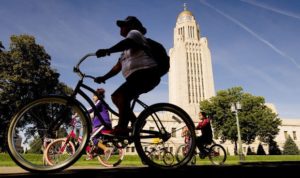 Creating a Successful ProposalIn 2018, Partners for Places adopted a 2018-2023 strategic plan. This RFP has been updated and designed to award projects that advance the vision, mission, theory of change, and goals of this new fund strategy. Please carefully review the newly created Proposal and Award Guidance document while preparing your proposal. The application deadline for Round 14 is January 31, 2019 (by 11:59 p.m., any time zone). Please visit the Partners for Places webpage for more information. Here you can view our promotional video, download the Request for Proposals (RFP), access our Proposal Form and Budget Form, and consult our new Proposal and Award Guidance document. |
Additional ResourcesInfo Webinar TFN will host a webinar to answer any questions about the grant program on Tuesday, December 11, at 2:00 p.m., Eastern Time. Please register for the webinar here. A recording of the webinar will be made available through our website for those of you unable to participate. Meet the Newest Grantees! We're excited to announce the Round 13 grantees of the Partners for Places matching grant program: Six communities across the U.S. will receive more than a million dollars to fund sustainability efforts that will help them better withstand the impact of climate change, prepare for natural disasters and engage local voices in planning and decision-making.Read more about our newest grantees here. |
Funder InvestorsPartners for Places general grant program is supported by The JPB Foundation, Kendeda Fund, The Kresge Foundation, New York Community Trust, the Pisces Foundation, The Summit Foundation, and Surdna Foundation. |
Selection ProcessA selection committee comprised of foundation representatives and urban sustainability directors will make grant selection decisions on behalf of Partners for Places, and awards will be announced in May, 2019. If the RFP and the Proposal and Award Guidance documents don’t answer all your questions, please contact Ashley Quintana at ashley@www.fundersnetwork.org for more information. We look forward to hearing from you!
|


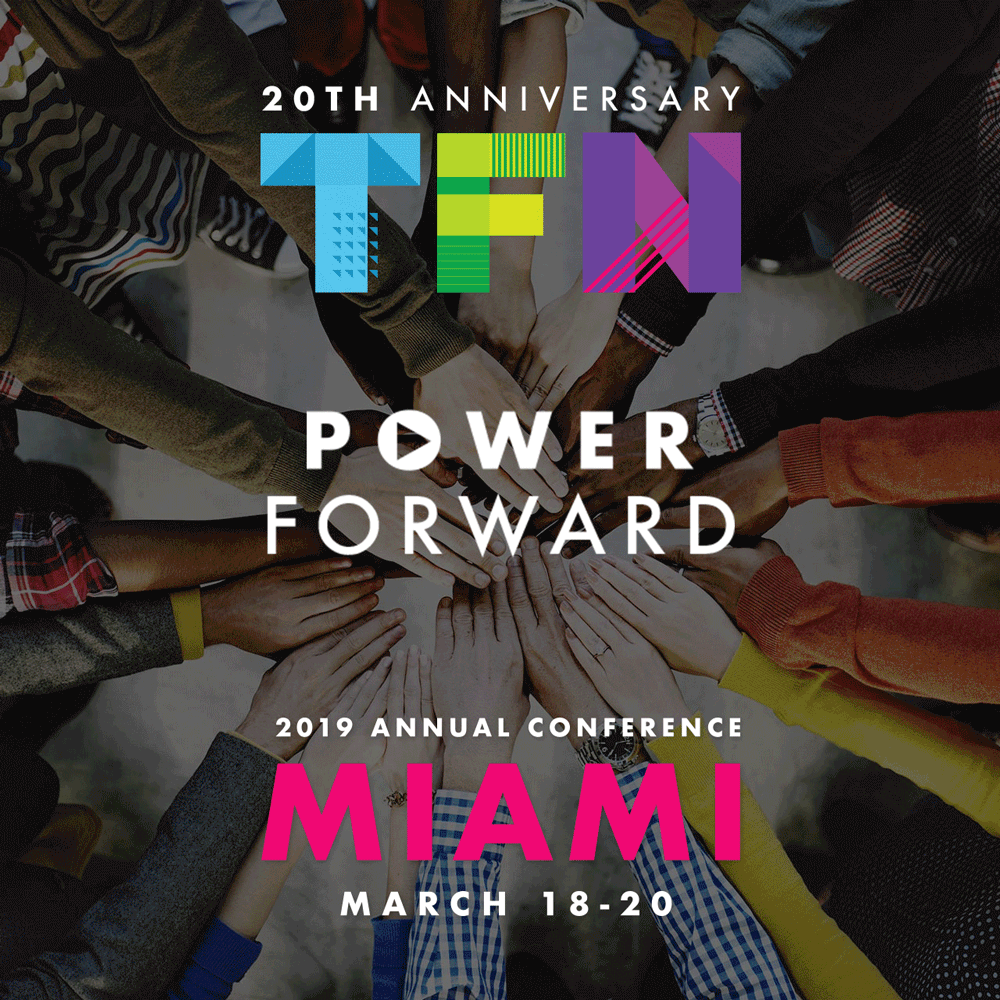

 Throughout the 1970's, an epidemic of fires consumed the South Bronx, reducing entire blocks to rubble, covering neighborhoods in a permanent haze of smoke and destroying 80 percent of the area’s housing stock. Black and Puerto Rican residents were blamed for the devastation even as they battled to save their neighborhoods. Decades later, Bronx-born filmmaker Vivian Vazquez set out to pursue the truth, uncovering policies of racism and neglect that still shape our cities. The resulting documentary,
Throughout the 1970's, an epidemic of fires consumed the South Bronx, reducing entire blocks to rubble, covering neighborhoods in a permanent haze of smoke and destroying 80 percent of the area’s housing stock. Black and Puerto Rican residents were blamed for the devastation even as they battled to save their neighborhoods. Decades later, Bronx-born filmmaker Vivian Vazquez set out to pursue the truth, uncovering policies of racism and neglect that still shape our cities. The resulting documentary, 







